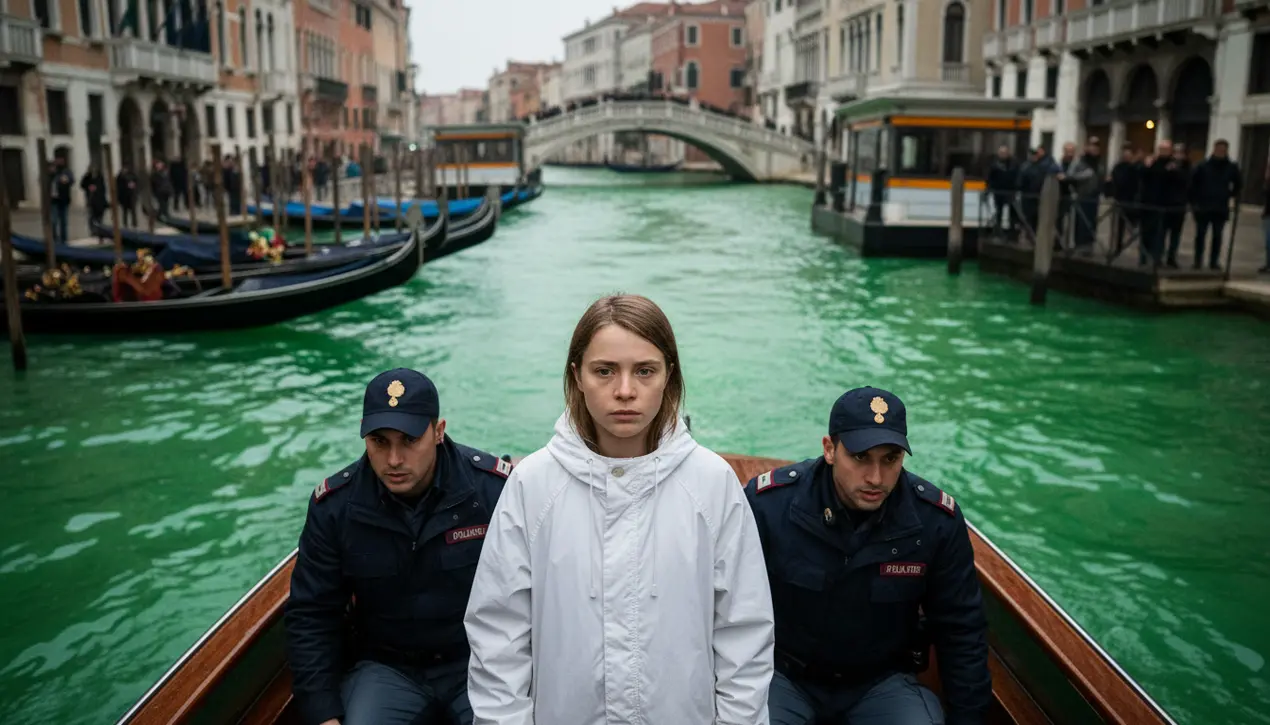
Politicsprotests & movementsClimate Activism
Greta Thunberg Banned From Venice After Dyeing Canal Green
RA
Rachel Adams
2 hours ago7 min read2 comments
In a dramatic escalation of environmental protest tactics that has drawn both fierce condemnation and reluctant admiration, climate activist Greta Thunberg has been officially banned from entering Venice following her participation in an Extinction Rebellion action that saw the city's iconic canals dyed a vivid, unsettling green. The stunt, intended as a stark visual metaphor for the ecological crises—from rising sea levels to algal blooms—threatening the UNESCO World Heritage site, instead resulted in her swift expulsion by Italian authorities, who decried the act as vandalism of a priceless cultural landmark.This incident is not an isolated one; it represents the latest, most confrontational chapter in a growing schism between institutional protocol and the increasingly desperate methods of the climate movement. Thunberg, since her solitary 'School Strike for Climate' began, has evolved from a lone figure outside Swedish parliament to a global symbol, her journey mirroring the climate debate's own shift from abstract concern to visceral, immediate threat.Venice itself, a city perpetually in a fragile dance with the water that defines it, serves as the perfect, poignant stage for this conflict. It is a place where the consequences of climate inaction are not theoretical but are measured in the Acqua Alta flooding St.Mark's Square and the very foundations of palazzos slowly succumbing to the sea. The non-toxic, fluorescein-based dye used in the protest is a far cry from the industrial pollutants and cruise ship emissions that daily challenge the lagoon's delicate ecosystem, a fact activists are keen to highlight, arguing that the temporary shock of green water is a necessary jolt to the public consciousness compared to the permanent, insidious damage of business-as-usual.However, critics, including many local Venetians and conservationists, counter that such tactics alienate potential allies and disrespect a city already on the front lines, reducing its complex struggle for survival to a political backdrop. The ban, while legally enforceable, raises profound questions about the boundaries of dissent in an age of ecological emergency.Is the defacement—however temporary—of a cultural treasure a justified price for sounding a global alarm? Or does it risk trivializing the cause, playing into the hands of those who dismiss climate activists as unruly idealists? For scientists like Dr. Elena Ricci, a marine biologist at the University of Padua, the protest, while disruptive, successfully hijacked the global news cycle.'For one day,' she noted, 'the world wasn't just talking about Venice's beauty, but about its peril. The green dye will wash away, but the image of a drowning city, now artificially colored as if sick, will linger.' The Italian government's response, however, was unequivocal, framing the act not as speech but as a crime, setting a precedent that could see similar actions met with even harsher penalties across Europe. This creates a dangerous feedback loop: as the climate crisis intensifies, so too does the frustration of activists, leading to more radical demonstrations, which in turn provoke stricter crackdowns from states prioritizing order and property.Thunberg's ban from Venice is therefore more than a travel restriction; it is a symbolic line in the sand, a declaration that even the most morally urgent of causes has limits when it confronts the sanctity of heritage and the rule of law. The emerald-green waters have receded, but the deep and troubled divide they revealed between symbolic action and tangible consequence, between desperate warning and public order, remains, murkier and more contentious than ever.
#Greta Thunberg
#Venice
#Extinction Rebellion
#climate protest
#canal dyeing
#ban
#environmental activism
#featured
Stay Informed. Act Smarter.
Get weekly highlights, major headlines, and expert insights — then put your knowledge to work in our live prediction markets.
Related News
Comments
Loading comments...
© 2025 Outpoll Service LTD. All rights reserved.